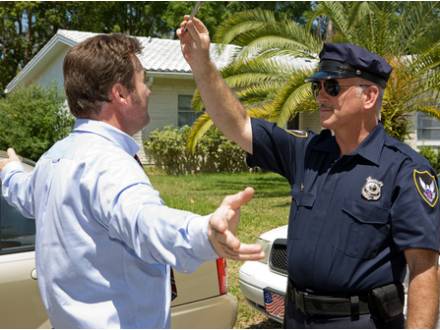Recent Blog Posts
Pulling a Gun During a Road Rage Incident in Texas
 Tense moments on Texas roads can turn dangerous in seconds. When tempers flare, some drivers reach for a firearm to "make a point." Doing so can bring serious criminal weapons charges, even if no shots are ever fired.
Tense moments on Texas roads can turn dangerous in seconds. When tempers flare, some drivers reach for a firearm to "make a point." Doing so can bring serious criminal weapons charges, even if no shots are ever fired.
Road rage incidents appear to be a serious problem in Texas. A July 2025 analysis found that Texas led the nation in gun-involved road rage incidents from 2014 to 2023, with hundreds of shootings, and most resulted in someone being hit. In response, lawmakers approved tougher penalties for shooting into or toward an occupied vehicle, slated to take effect September 1, 2025. If you are facing charges for allegedly brandishing a weapon during a traffic incident, a San Antonio, TX weapon charges defense attorney can help you build your defense.
Is Marijuana Still Illegal in Texas?
 While many states have taken steps to legalize cannabis, Texas has not followed suit. Despite growing acceptance of marijuana across the country, Texas continues to enforce strict penalties for marijuana possession, use, and distribution under certain conditions. If you are facing charges related to marijuana in Texas, you should understand how the law applies to your case. An experienced San Antonio, TX drug crimes defense attorney can help.
While many states have taken steps to legalize cannabis, Texas has not followed suit. Despite growing acceptance of marijuana across the country, Texas continues to enforce strict penalties for marijuana possession, use, and distribution under certain conditions. If you are facing charges related to marijuana in Texas, you should understand how the law applies to your case. An experienced San Antonio, TX drug crimes defense attorney can help.
Does Texas Allow Recreational Use of Cannabis?
Recreational possession of marijuana is a criminal offense under the Texas Controlled Substances Act. While other states have legalized marijuana for adults over 21, Texas has not passed any laws permitting recreational marijuana use. This means that if you are caught with marijuana, even in small amounts, you could face serious legal consequences.
What Happens if I Get a DWI With a Child in the Car in Texas?
 Getting arrested for driving while intoxicated (DWI) is always serious, but the consequences are even more severe if a child is in the vehicle. In Texas, this type of charge is considered child endangerment and can lead to felony charges, jail time, and even involvement from child protective services. If you have been accused of DWI with a child passenger, a San Antonio, TX DWI attorney can help you understand the law and your rights.
Getting arrested for driving while intoxicated (DWI) is always serious, but the consequences are even more severe if a child is in the vehicle. In Texas, this type of charge is considered child endangerment and can lead to felony charges, jail time, and even involvement from child protective services. If you have been accused of DWI with a child passenger, a San Antonio, TX DWI attorney can help you understand the law and your rights.
What Does Texas Law Say About DWI With a Child Passenger?
Texas Penal Code § 49.045 addresses what happens if someone drives a vehicle in a public place while intoxicated and there is a child in the car. The law specifically states the child must be under 15 for the charge of DWI with a child passenger to apply. This offense is classified as a state jail felony, a type of felony that falls between a misdemeanor and more serious felonies. The charge is elevated even if it is your first offense, and no one was injured. Keep in mind that this is different from a standard DWI. The presence of a child automatically makes the case more serious.
How Can Police Misconduct Impact Drug Crime Defense in Texas?
 Facing federal or state drug charges in Texas means you need a strong defense to challenge the allegations against you. Even when prosecutors believe they have strong evidence, constitutional protections exist to ensure fairness and justice. Police misconduct can dramatically affect the outcome of a drug case, sometimes resulting in suppressed evidence or dismissed charges. A San Antonio, TX drug crimes defense attorney knows that exposing misconduct is often the key to building a successful defense.
Facing federal or state drug charges in Texas means you need a strong defense to challenge the allegations against you. Even when prosecutors believe they have strong evidence, constitutional protections exist to ensure fairness and justice. Police misconduct can dramatically affect the outcome of a drug case, sometimes resulting in suppressed evidence or dismissed charges. A San Antonio, TX drug crimes defense attorney knows that exposing misconduct is often the key to building a successful defense.
How Do Illegal Searches and Seizures Affect Drug Charges in Texas?
One of the most common forms of police misconduct in drug cases involves illegal searches and seizures. The Fourth Amendment to the U.S. Constitution and Article I, Section 9 of the Texas Constitution protect you from unreasonable searches. Police typically need a valid search warrant supported by probable cause before they can search you or your property.
What to Do If You Are Accused of Mortgage Fraud in Texas
 Facing charges of mortgage fraud in Texas is serious business. A felony conviction can carry substantial fines and prison time. If you are under investigation or have been formally charged, you need a knowledgeable Texas mortgage fraud defense attorney to protect your rights. Building a strong defense strategy requires a nuanced understanding of Texas criminal law and experience facing these challenges in court.
Facing charges of mortgage fraud in Texas is serious business. A felony conviction can carry substantial fines and prison time. If you are under investigation or have been formally charged, you need a knowledgeable Texas mortgage fraud defense attorney to protect your rights. Building a strong defense strategy requires a nuanced understanding of Texas criminal law and experience facing these challenges in court.
What Is Mortgage Fraud Under Texas Law?
Under Texas Penal Code § 32.32, mortgage fraud is generally prosecuted as part of a broad offense of making false statements to obtain property or credit. This includes knowingly making a false or misleading written statement to obtain a mortgage loan. Cases often involve alleged misrepresentations about income, employment, debt obligations, property value, or occupancy status.
Is Boating and Drinking Really a Crime in Texas?
 Boating while intoxicated (BWI) is an actual criminal charge in Texas, and it comes with real-life consequences. Taking the boat out on the water during a hot Texas summer sounds like the perfect way to relax, but you have to obey the law and not drink beyond the legal limit if you are going to be driving a boat. If you were recently charged with BWI, an experienced Texas boating while intoxicated defense attorney can explain the charge against you and what you can do to challenge it in court.
Boating while intoxicated (BWI) is an actual criminal charge in Texas, and it comes with real-life consequences. Taking the boat out on the water during a hot Texas summer sounds like the perfect way to relax, but you have to obey the law and not drink beyond the legal limit if you are going to be driving a boat. If you were recently charged with BWI, an experienced Texas boating while intoxicated defense attorney can explain the charge against you and what you can do to challenge it in court.
Is a BWI Charge Similar to a DWI Charge in Texas?
A BWI charge is similar to a driving while intoxicated (DWI) charge, which is Texas’s official version of driving under the influence (DUI). However, under Texas law, a BWI specifically refers to the action of operating a watercraft while your blood alcohol concentration (BAC) is above the legal limit. A BWI is typically a Class B misdemeanor, but the charge escalates to a felony if a child passenger was on the boat.
How To Handle Allegations of Internet Crimes in Texas
 Facing charges for an internet crime can be confusing. The laws that govern these cases have to evolve rapidly to account for the ever-changing nature of the internet and understanding exactly what you are up against –and how to defend yourself – can be very challenging. The first step in facing these charges is to contact an experienced Texas internet crimes defense attorney. Being informed and knowing how to respond to the charges could significantly affect how your case turns out.
Facing charges for an internet crime can be confusing. The laws that govern these cases have to evolve rapidly to account for the ever-changing nature of the internet and understanding exactly what you are up against –and how to defend yourself – can be very challenging. The first step in facing these charges is to contact an experienced Texas internet crimes defense attorney. Being informed and knowing how to respond to the charges could significantly affect how your case turns out.
What Are Internet Crimes?
In Texas, internet crimes, or cybercrime, refer to illegal actions committed digitally or online. Many offenses can fall under this umbrella, including the following:
-
Bullying or making threats of physical violence
-
Fraud, such as money laundering and identity theft
-
The unauthorized acquisition of confidential information, known as cyber espionage
Homicide Charges and Possible Defenses in Texas
 If you are facing a homicide charge, the most important thing you can do is speak to an experienced legal representative as soon as possible. This is among the most serious of criminal offenses and can have a drastic and devastating impact on the rest of your and your family’s lives. A San Antonio, TX homicide attorney will help you understand the charges against you and the possible defense strategies that may effectively challenge the prosecution’s case. First, consider the types of homicide charges and how they are commonly fought.
If you are facing a homicide charge, the most important thing you can do is speak to an experienced legal representative as soon as possible. This is among the most serious of criminal offenses and can have a drastic and devastating impact on the rest of your and your family’s lives. A San Antonio, TX homicide attorney will help you understand the charges against you and the possible defense strategies that may effectively challenge the prosecution’s case. First, consider the types of homicide charges and how they are commonly fought.
How Does Texas Law Define Homicide?
The Texas Penal Code establishes four types of criminal homicide:
-
Murder: This is the most serious charge, referring to the killing of someone with the intent to kill or seriously harm. The prosecution argues that the offender knew their actions would cause severe injuries or death.
When Does a Texas Gun Case Fall Under Federal Jurisdiction?
 Gun cases in Texas can be complicated, potentially involving federal and state authorities. Sometimes, a case can begin as a state charge and be escalated to federal jurisdiction.
Gun cases in Texas can be complicated, potentially involving federal and state authorities. Sometimes, a case can begin as a state charge and be escalated to federal jurisdiction.
If you have been accused of a state or federal gun crime, a San Antonio, TX federal gun crimes defense attorney can help you understand the laws that apply to your case and how you may be able to challenge the charges. First, consider the difference between state and federal charges and the types of cases that fall under both.
Difference Between Federal and State Jurisdiction
In the simplest terms, state jurisdiction covers gun crimes that violate Texas state laws, and federal jurisdiction applies when federal laws are violated. When the state has jurisdiction, the authorities involved are state or county prosecutors and local police, and they follow state law. Under federal jurisdiction, the Bureau of Alcohol, Tobacco, Firearms, and Explosives (ATF) or the FBI will typically handle the investigative work, and U.S. attorneys often prosecute.
What Happens if You Fail a Breathalyzer During a DWI Stop?
 Every case is different, but in general, if you fail a Breathalyzer test after being stopped for Driving While Intoxicated (DWI), that does not mean that you are definitively guilty. While it is evidence that the persecution will likely use against you, an experienced San Antonio DWI defense attorney may be able to challenge the test results.
Every case is different, but in general, if you fail a Breathalyzer test after being stopped for Driving While Intoxicated (DWI), that does not mean that you are definitively guilty. While it is evidence that the persecution will likely use against you, an experienced San Antonio DWI defense attorney may be able to challenge the test results.
How Can You Challenge a Failed Breath Test?
There are several defenses your lawyer may use to challenge a failed breath test admitted as evidence, including:
-
Improper test administration: Texas has a procedure for administering a Breathalyzer test. Your attorney may challenge the validity if they find evidence of procedural violation, such as handling or storing the test incorrectly.
-
Fourth Amendment rights violation: The officer who stopped you needed probable cause to administer the test. Without it, your representative could argue for suppression of the evidence on the grounds that they violated your Fourth Amendment rights.





